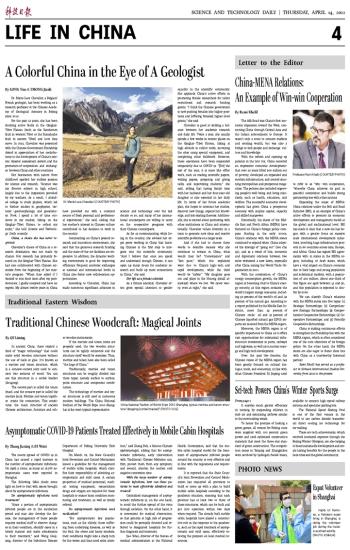
 |
 |
| Dr. Marie-Luce Chevalier. (COURTESY PHOTO) |
Dr. Marie-Luce Chevalier, a Belgian/French geologist, has been working as a research professor at the Chinese Academy of Geological Sciences in Beijing since 2010.
For the past 12 years, she has been studying active faults in the Qinghai-Tibet Plateau (such as the Karakorum fault in western Tibet or the Xianshuihe fault in eastern Tibet) and how they move. In 2021, Chevalier was presented with the Chinese Government Friendship Award in appreciation of her contributions to the development of China's seismic disaster assessment system and the promotion of cooperation and exchanges between China and other countries.
Her fascination with nature from childhood sparked her endless passion for science and research. "Science was my favorite subject in high school, largely due to the inspiration provided by my teachers. As a result, I attended college to study physics, which led to further studies in geophysics, tectonic -geomorphology, and geosciences. Now, I spend a lot of time outdoors in my studies, hiking on the Qinghai-Tibet Plateau to collect my rocks," she told Science and Technology Daily recently.
China, a choice she has never regretted
Chevalier's choice of China as a research destination was not made by chance. Her research has primarily focused on the Qinghai-Tibet Plateau. She had also collaborated with Chinese scientists from the beginning of her master's program. "When they asked if I wanted to join their team after my post-doctorate, I gladly accepted and have no regrets. My almost twelve years in China have provided me with a constant source of fresh personal and professional experiences," she said, adding that her mother's interest in Chinese culture contributed to her decision to work in the country.
Commenting on China's present research and innovation environment, she said that the generous research funding and the state-of-the-art facilities are impressive. In addition, the dynamic working environment is good for improving efficiency. Frequent academic exchanges at national and international levels in China also foster new collaboration opportunities.
According to Chevalier, China has made numerous significant advances in science and technology over the last decade or so, and many of her international counterparts are willing to carry on the cooperative programs with their Chinese counterparts.
As far as communicating while living in the country, she advised her expat peers working in China that learning Chinese is the first step to integrate into the scientific community. "And I believe that once you speak and understand enough Chinese, it can open up many doors for academic research and build up more connections in China," she said.
Her life as a female scientist
As a female scientist, Chevalier often gives special attention to gender equality in the scientific community. She applauds China's active efforts in promoting female researchers for talent recruitment and research funding grants. "I think the Chinese government is now pushing females into higher positions and [offering females] higher-level grants," she said.
Chevalier is good at striking a balance between her academic research and daily life. Twice a year, she usually spends a few weeks in remote places on the Qinghai-Tibet Plateau, hiking at high altitude to collect rocks, surveying the sites using special equipment, and completing other fieldwork. However, these operations have been suspended temporarily due to COVID-19. "[For] the rest of the year, it is more like office work, such as reading scientific papers, writing papers, preparing and giving talks, and supervising students," she said, adding that having family time with her husband and her four-year-old daughter is also essential in her daily life. In terms of her future academic plan, she hopes to continue her studies, discover new things, expand her knowledge, and test existing theories. Additionally, she is excited about partnering with other institutions in China and internationally. Chevalier values diversity in a team to generate new ideas and resolve scientific problems on a larger scale.
And if she had to choose three words to describe reasons why she continues to remain in China, what would they be? "Convenience" and "fast pace," which she explained were due to China's high-tech and rapid development, while the third would be "safety." "My daughter goes out and plays in the Hutong (small alleyways) where we live. We never worry, even at night," she said.







